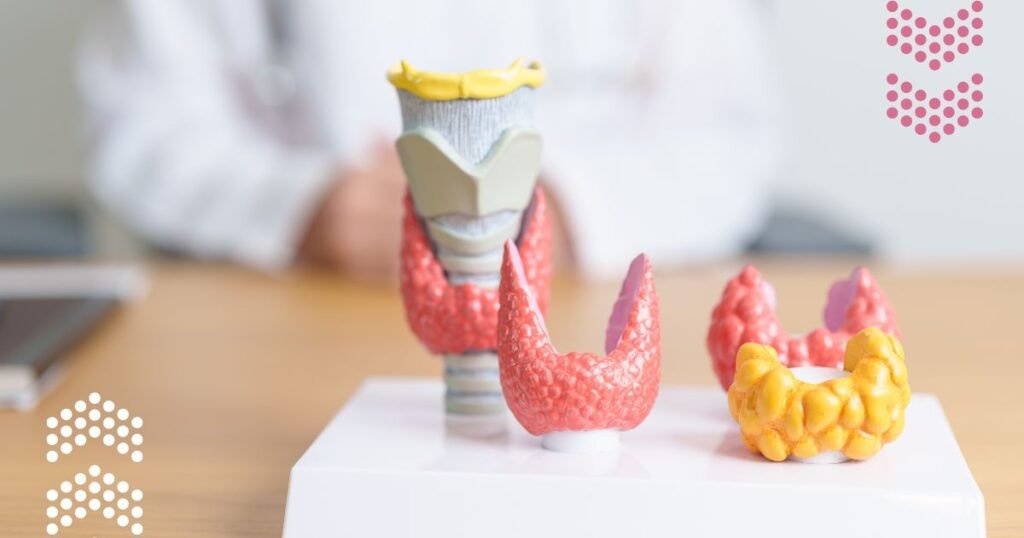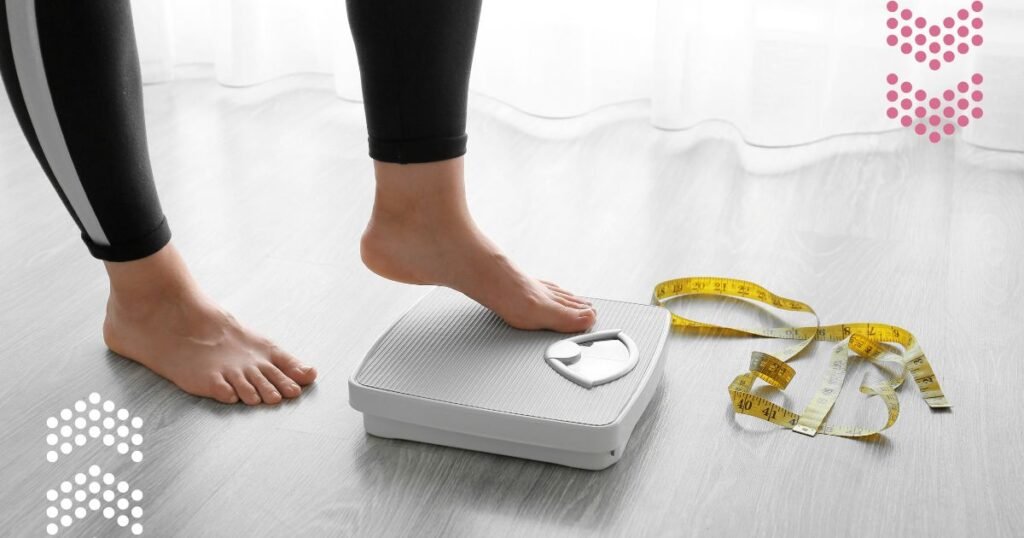Postpartum Thyroiditis: How It Affects Women’s Weight Loss
Postpartum thyroiditis is a condition many women may encounter within the first year after childbirth, but it often goes undiagnosed. It can have a significant impact on postpartum weight loss, making it even more challenging for new mothers to shed the extra pounds gained during pregnancy.
Understanding the connection between postpartum thyroiditis and weight loss can help women approach their health with a clearer, more focused plan. This article will discuss the symptoms, phases, and management strategies for postpartum thyroiditis, with a particular focus on its effects on weight.
What is Postpartum Thyroiditis?
Postpartum thyroiditis is an inflammation of the thyroid gland that occurs within the first year after childbirth. This condition typically progresses through two phases: hyperthyroidism (overactive thyroid) and hypothyroidism (underactive thyroid), both of which can affect weight loss and metabolism.
The thyroid gland regulates the body’s metabolism through the release of thyroid hormones. When it becomes inflamed, as in postpartum thyroiditis, these hormones can be released in abnormal amounts, either too much or too little, leading to various symptoms that directly impact metabolism and energy levels.
The Hyperthyroid Phase
The hyperthyroid phase usually occurs within the first few months postpartum. During this phase, the thyroid becomes overactive and produces more thyroid hormones than the body needs. This leads to an accelerated metabolism, which can cause unintended weight loss, increased appetite, and anxiety.
Despite eating more, women in the hyperthyroid phase may still lose weight. However, this phase typically doesn’t last long and is often followed by the hypothyroid phase, where weight gain becomes more of a concern.
The Hypothyroid Phase
The hypothyroid phase follows the hyperthyroid phase and may last several months. During this phase, the thyroid slows down and produces too little thyroid hormone. This leads to a sluggish metabolism, fatigue, weight gain, and difficulty losing weight.
Many women find this phase particularly frustrating, as they may feel exhausted, lack energy for exercise, and struggle to lose weight despite making dietary changes. This phase is where most of the weight-related challenges associated with postpartum thyroiditis occur.
Symptoms of Postpartum Thyroiditis
Hyperthyroid Phase Symptoms
During the hyperthyroid phase, women may experience the following symptoms:
- Unintended weight loss despite an increased appetite
- Insomnia or difficulty sleeping
- Anxiety, nervousness, or irritability
- Increased heart rate
- Excessive sweating
These symptoms can be mistaken for normal postpartum changes, such as the stress and anxiety of caring for a newborn, making it difficult to diagnose thyroid issues early on.
Hypothyroid Phase Symptoms
Once the condition moves into the hypothyroid phase, symptoms can include:
- Weight gain or difficulty losing weight
- Extreme fatigue and low energy levels
- Depression or a general sense of sadness
- Dry skin and hair loss
- Constipation
The symptoms of hypothyroidism can significantly affect a woman’s ability to engage in regular physical activity, further complicating efforts to lose weight after pregnancy.
How Postpartum Thyroiditis Impacts Metabolism and Weight Loss
The thyroid gland is crucial for regulating the body’s metabolism, which controls how quickly you burn calories. In the hyperthyroid phase, an overactive thyroid speeds up the metabolism, often leading to weight loss even if a woman is consuming more calories.
However, this rapid weight loss is usually short-lived. As the condition progresses to hypothyroidism, the metabolism slows down, leading to weight gain and making it difficult to lose weight. Women with hypothyroidism may struggle to burn calories efficiently, even with diet and exercise.
The changes in metabolism caused by postpartum thyroiditis can lead to confusion and frustration for women trying to lose weight after childbirth. They may experience both weight loss and weight gain in a relatively short period, which can feel like a setback in their postpartum weight loss journey.
Postpartum Thyroiditis vs. Regular Postpartum Weight Challenges
Postpartum weight retention is common for many women, even those without thyroid issues. However, for women with postpartum thyroiditis, the weight loss journey can be more complicated due to the thyroid’s effect on metabolism.
In typical postpartum weight loss scenarios, hormonal fluctuations and lifestyle changes are the primary factors affecting weight retention. But for women with postpartum thyroiditis, the thyroid itself becomes an additional obstacle.
Understanding the thyroid’s role is essential for distinguishing between regular postpartum weight struggles and thyroid-related issues.
Diagnosis of Postpartum Thyroiditis
Diagnosing postpartum thyroiditis requires a blood test to measure thyroid hormone levels. Common tests include TSH (thyroid-stimulating hormone) and T4, which help determine whether the thyroid is overactive or underactive.
If you’re experiencing symptoms of thyroid issues such as unexplained weight changes, fatigue, or mood swings, it’s important to seek medical advice. A healthcare provider can help confirm whether postpartum thyroiditis is contributing to your weight loss difficulties.
Early diagnosis is critical, as it allows women to address both their thyroid function and weight management strategies simultaneously, leading to more successful outcomes in their weight loss efforts.
Managing Postpartum Thyroiditis for Weight Loss Success
Medical Treatments for Thyroid Management
Managing postpartum thyroiditis often involves medical treatment, such as hormone replacement therapy (HRT) or other medications to regulate thyroid function. These treatments help stabilize hormone levels, allowing for a more consistent metabolism, which is crucial for weight loss success.
Your healthcare provider may also suggest regular monitoring of thyroid levels to adjust medications as needed, ensuring that your thyroid stays balanced during recovery. Stabilizing thyroid function is the first step to overcoming the weight challenges associated with postpartum thyroiditis.
Weight Loss Strategies for Women with Thyroid Issues
Women dealing with thyroid issues should adopt a slow and steady approach to weight loss. Rapid weight loss can further stress the thyroid and worsen hypothyroid symptoms. Instead, focus on balanced nutrition, moderate calorie reduction, and consistent exercise.
Resistance training is highly beneficial for women with thyroid issues. Building muscle helps increase your metabolic rate, making it easier to burn calories and lose weight. Focus on compound exercises that target multiple muscle groups for maximum effectiveness.
Incorporating cardiovascular activities like walking or swimming is also helpful, especially during the hypothyroid phase when energy levels are low.
Diet and Nutrition Tips for Women with Postpartum Thyroiditis
Foods to Support Thyroid Health
Certain nutrients play a key role in supporting thyroid function. Iodine, selenium, and zinc are essential for healthy thyroid hormone production. Foods such as seaweed, fish, eggs, and nuts are rich in these nutrients and can help boost thyroid health.
Additionally, eating a balanced diet rich in whole foods, including fruits, vegetables, lean proteins, and healthy fats, supports a healthy metabolism and can help counteract the weight gain associated with hypothyroidism.
Foods to Avoid
Some foods, known as goitrogens, may interfere with thyroid function, especially in those with existing thyroid issues. These include cruciferous vegetables like broccoli, cauliflower, and cabbage, as well as soy-based products. It’s best to limit these foods, especially when dealing with an underactive thyroid.
Hydration is also critical for maintaining metabolic function. Dehydration can exacerbate fatigue and slow down metabolic processes, further complicating weight loss efforts. Make sure to drink plenty of water throughout the day.
Exercise Strategies for Postpartum Women with Thyroid Issues
Low-Impact Exercise
Low-impact exercises such as walking, swimming, and yoga are ideal for postpartum women managing thyroid issues. These exercises help improve overall fitness without overloading the body, which is important during the hypothyroid phase when energy levels are low.
Gentle, consistent movement is key. Even a 30-minute walk can help boost your metabolism, improve mood, and support weight loss without putting too much strain on your body during thyroid recovery.
Resistance Training
Resistance training is essential for rebuilding muscle mass and enhancing metabolic rate, which is crucial for counteracting the effects of hypothyroidism. Building muscle helps burn more calories at rest, making it easier to lose weight.
Focus on strength training exercises that target multiple muscle groups, such as squats, lunges, and push-ups, to maximize results. Gradually increase the intensity of your workouts as your energy levels improve.
Mental and Emotional Health: Dealing with Postpartum Thyroiditis and Weight Loss Pressure
The emotional toll of postpartum thyroiditis can be overwhelming. Symptoms like anxiety, depression, and fatigue can make it difficult to stay motivated and maintain a positive outlook on weight loss. Women may feel frustrated by the slow progress or sudden weight gain.
It’s important to practice self-care and employ stress management techniques, such as meditation, journaling, and joining support groups. Managing stress can help regulate cortisol levels, which, when elevated, can further disrupt thyroid function and make weight loss even more challenging.
How to Track Progress Safely During Thyroid Recovery
Non-Scale Victories
During thyroid recovery, it’s essential to focus on non-scale victories to measure progress. These include improvements in energy levels, better sleep quality, and how clothes fit. Celebrate these small milestones, as they indicate progress even if the number on the scale doesn’t reflect your hard work.
Monitor Thyroid Levels
Regularly monitoring your thyroid levels with your healthcare provider is crucial. This helps you adjust your treatment plan and weight loss strategy as necessary. Keep in mind that extreme diets and rapid weight loss methods can further stress your thyroid, delaying recovery.
The Importance of Patience and Long-Term Perspective
Patience is key when dealing with postpartum thyroiditis. Weight loss during thyroid recovery may take longer than expected, but gradual progress is more sustainable and better for your overall health. Focus on long-term goals rather than quick results.
Many women with postpartum thyroiditis eventually regain control of their thyroid health and weight. With the right combination of medical treatment, healthy eating, and regular exercise, it’s possible to overcome thyroid-related weight challenges and achieve long-lasting results.
Conclusion
Postpartum thyroiditis can make losing weight after childbirth more challenging, but understanding its effects and following a targeted approach can lead to success. With proper diagnosis, treatment, and lifestyle changes, women can overcome thyroid issues and achieve their weight loss goals.
For more information on how postpartum thyroiditis affects weight retention, check out our article on postpartum weight retention.
If you’re struggling with thyroid-related weight loss, consider exploring trusted resources to learn more about women’s weight loss challenges. Browse our website for comprehensive resources, including weight loss programs, fitness tools, and a blog tailored to women’s health.


